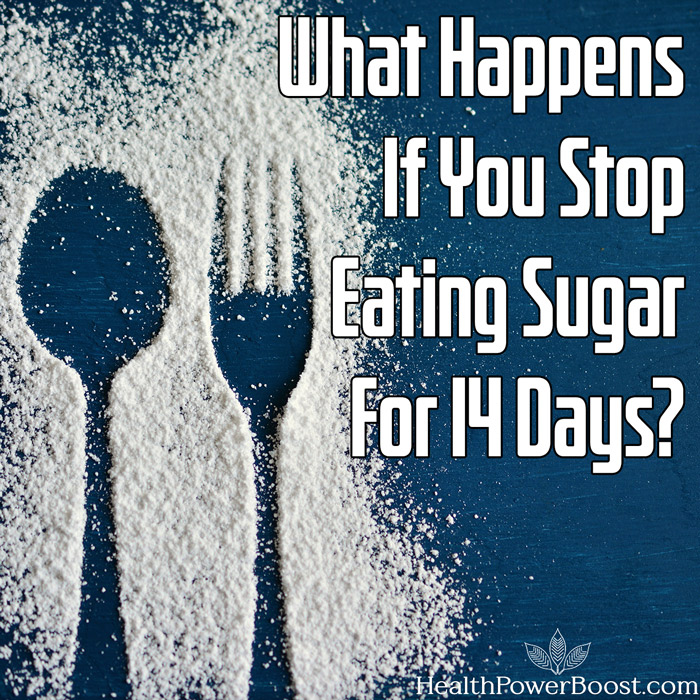This website is not medical advice. Posts may contain affiliate links from which I earn commissions at no additional cost to you.

What Happens If You Stop Eating Sugar For 14 Days Graphic © healthpowerboost.com. Background photo: Pixabay (PD)
Research has shown that around 90% of Americans usually exceed the recommended daily sugar intake. [1] The Dietary Guidelines for Americans recommend not more than 9 teaspoons of sugar for men and 6 for women—yet the average daily intake among Americans is 17 teaspoons. The USA is a major culprit but this is a global problem and most other countries have a similar problem. There are several reasons for this.

For one, sugar is “socially accepted” and very widely available in many foods—from obvious sources like confectionaries to unexpected ones like bread or sauces. And even when you know where the sugar is, shaking off the habit is not easy. Sugar is a pleasing taste to most and research shows that it affects the brain’s reward center—making you crave it despite the potential negative consequences. [2]
But if you’re looking to give up the sweet stuff, it can lead to noticeable changes in your body in the short term and long term. Here’s what you can expect from cutting sugar out of your diet:
1: Reduction In Sugar Cravings
Consuming sugary beverages and foods stimulates the brain’s reward center by triggering dopamine release. [3] This fuels cravings and may lead to withdrawal symptoms such as anxiety and headaches.
However, the cravings should reduce after cutting down on sugary foods for a few days. Consider stopping your sugar intake gradually to ease the transition and minimize the side effects.

2: More Energy
A steadier energy supply is one of the first health benefits you’ll experience after you stop eating sugar. Sugar is a simple carbohydrate that is absorbed quickly into the bloodstream. It gives you a quick burst of energy followed by an equally quick crash, leaving you lethargic and tired.
Cutting out added sugars and replacing them with proteins, complex carbs, and high-fiber alternatives facilitates a steady supply of energy throughout the day. You may also get more restful sleep, which contributes to your feeling of well-being and energy. [4]
3: Better Appetite Management
Cutting out added sugar may improve your body’s glucose management. This could help restore healthy leptin activity, which is adversely affected by conditions linked to high-sugar intake, such as insulin resistance and obesity. [5]
Leptin is a hormone that plays a role in regulating your appetite and metabolism. Restoring its function reduces appetite and hunger.
4: Improved Mood And Reduced Risk Of Mental Health Issues

If you tend to reach out for a sugary treat following a stressful day, you may want to reconsider it. According to a study published in Neuroscience & Behavioral Reviews, sugar is not the boost-booster some people assume it to be. [6] It’s more likely to leave you feeling “down” and fogy-headed.
Other studies suggest that added sugar’s high glycemic index may contribute to a greater risk of anxiety, depression, and other mental health issues. [7] This may be linked to increased inflammation in the brain.
5: Healthier Skin
Yearning for youthful, healthy skin even as you age? Kicking added sugars to the curb is a good place to start.
A study appearing in Clinics in Dermatology reports that eating too much sugar may impair your body’s ability to repair collagen. [8] Collagen is a protein that helps strengthen your skin and support good elasticity. Hindering its repair may contribute to premature wrinkles and loss of elasticity.
A high-sugar diet also increases the production of AGEs (advanced glycation end products), which are linked to accelerated skin aging. So cutting out added sugar may help slow your skin’s rate of aging. [9] Some studies even link high sugar intake to an increased risk of developing acne. [10]
6: Healthier Heart
You may love your sugary confectionaries and desserts from the “bottom of your heart,” but your heart is not too fond of the habit.
As mentioned earlier, eating added sugars spikes your glucose levels. Your body may increase insulin to compensate for the high blood glucose, which then increases blood pressure. This is a major concern because high blood pressure is a well-known risk factor for cardiovascular disease.
In fact, a study published in JAMA Internal Medicine found that people who consumed the most added sugars had a higher risk of fatal cardiovascular disease than those who ate less. [11]
7: Reduce The Risk Of Diabetes
Diabetes is one of the leading causes of reduced life expectancy and mortality—with its prevalence continuing to soar. [12] Research suggests that excessive sugar consumption may be associated with an increased risk of developing diabetes—either directly or indirectly through increased body fat. [13]
Conclusion:
Excessive consumption of added sugar has a long list of negative health effects. Research suggests that you’re better off without added sugars. One of the best ways to limit your intake of added sugars is by making smart purchase decisions. If you don’t have it in the house, you can’t reach for it when you get that sudden snack craving! Swap sugary foods and beverages for healthier alternatives. You can also consider eating whole, unprocessed foods by making meals at home.
=====================================================
References:
[1] 2015-2020 Dietary Guidelines for Americans: https://www.dietaryguidelines.gov/sites/default/files/2020-07/PartD_Ch12_AddedSugars_first-print.pdf
[2] Mysels, D. J., & Sullivan, M. A. (2010). The relationship between opioid and sugar intake: review of evidence and clinical applications. Journal of opioid management, 6(6), 445: https://www.ncbi.nlm.nih.gov/pmc/articles/PMC3109725/
[3] Wiss, D. A., Avena, N., & Rada, P. (2018). Sugar addiction: from evolution to revolution. Frontiers in psychiatry, 545: https://www.ncbi.nlm.nih.gov/pmc/articles/PMC6234835/
[4] St-Onge, M. P., Roberts, A., Shechter, A., & Choudhury, A. R. (2016). Fiber and saturated fat are associated with sleep arousals and slow wave sleep. Journal of Clinical Sleep Medicine, 12(1), 19-24: https://jcsm.aasm.org/doi/10.5664/jcsm.5384
[5] Amitani, M., Asakawa, A., Amitani, H., & Inui, A. (2013). The role of leptin in the control of insulin-glucose axis. Frontiers in neuroscience, 7, 51: https://www.ncbi.nlm.nih.gov/pmc/articles/PMC3619125/
[6] Mantantzis, K., Schlaghecken, F., Sünram-Lea, S. I., & Maylor, E. A. (2019). Sugar rush or sugar crash? A meta-analysis of carbohydrate effects on mood. Neuroscience & Biobehavioral Reviews, 101, 45-67: https://www.sciencedirect.com/science/article/abs/pii/S0149763418309175?via%3Dihub
[7] Gangwisch, J. E., Hale, L., Garcia, L., Malaspina, D., Opler, M. G., Payne, M. E., … & Lane, D. (2015). High glycemic index diet as a risk factor for depression: analyses from the Women’s Health Initiative. The American journal of clinical nutrition, 102(2), 454-463: https://www.ncbi.nlm.nih.gov/pmc/articles/PMC4515860/pdf/ajcn103846.pdf
[8] Danby, F. W. (2010). Nutrition and aging skin: sugar and glycation. Clinics in dermatology, 28(4), 409-411: https://pubmed.ncbi.nlm.nih.gov/20620757/
[9] Cao, C., Xiao, Z., Wu, Y., & Ge, C. (2020). Diet and skin aging—From the perspective of food nutrition. Nutrients, 12(3), 870: https://www.ncbi.nlm.nih.gov/pmc/articles/PMC7146365/
[10] Kucharska, A., Szmurło, A., & Sińska, B. (2016). Significance of diet in treated and untreated acne vulgaris. Advances in Dermatology and Allergology/Postępy Dermatologii i Alergologii, 33(2), 81-86: https://www.ncbi.nlm.nih.gov/pmc/articles/PMC4884775/
[11] Yang, Q., Zhang, Z., Gregg, E. W., Flanders, W. D., Merritt, R., & Hu, F. B. (2014). Added sugar intake and cardiovascular diseases mortality among US adults. JAMA internal medicine, 174(4), 516-524: https://jamanetwork.com/journals/jamainternalmedicine/fullarticle/1819573
[12] Lin, X., Xu, Y., Pan, X., Xu, J., Ding, Y., Sun, X., … & Shan, P. F. (2020). Global, regional, and national burden and trend of diabetes in 195 countries and territories: an analysis from 1990 to 2025. Scientific reports, 10(1), 1-11: https://www.ncbi.nlm.nih.gov/pmc/articles/PMC7478957/
[13] Stanhope, K. L. (2016). Sugar consumption, metabolic disease and obesity: The state of the controversy. Critical reviews in clinical laboratory sciences, 53(1), 52-67: https://www.ncbi.nlm.nih.gov/pmc/articles/PMC4822166/
😳 What Tinnitus Does To Your Brain Cells (And How To Stop It)
After 47 years of studies and countless brain scans done on more than 2,400 tinnitus patients, scientists at the MIT Institute found that in a shocking 96% of cases, tinnitus was actually shrinking their brain cells.
As it turns out, tinnitus and brain health are strongly linked.
Even more interesting: The reason why top army officials are not deaf after decades of hearing machine guns, bombs going off and helicopter noises…
Is because they are using something called "the wire method", a simple protocol inspired by a classified surgery on deaf people from the 1950s...
★ Does Your Salad Contain This Vegetable?
★ Try This 100% Natural Essential Oil Mix For Nail Fungus:
★ I Can't Help Showing This Off:
If you haven't heard of Claude Davis yet do yourself a huge favor and watch this video.
One of the smartest guys I ever had the pleasure of meeting, Claude set-up a unique prepping system that changed his life forever.
I already tried it myself and let me tell... you I was completely blown away... His surprising tactics could make your life easier and give you the peace of mind you deserve.
Don't just take my word for it... watch his short video and decide for yourself.








